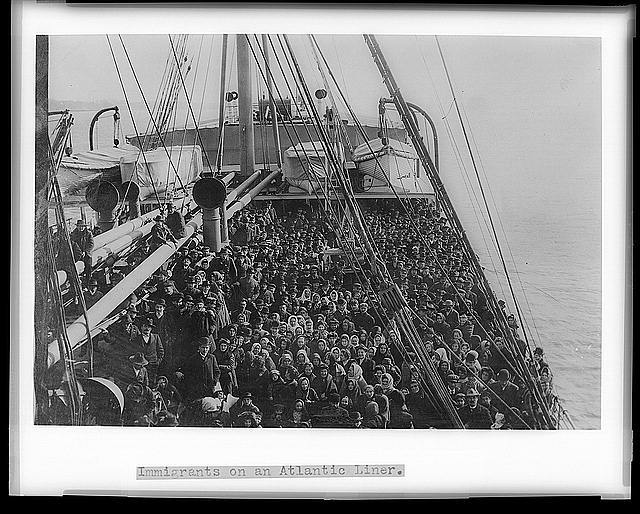Locals, Immigrants, Refugees, “Expats” - Our Common Search for Happiness

Written by Carter Charles
Benjamin Franklin was one of the most enlightened minds of America. I used to think of him as an example of the ideal type of person, one devoted to improving the conditions of mankind. I still think he was a great man but I came to see him in a more realistic light when I read the following letter, written by Franklin, in one of my history classes. Here is an excerpt:
“[I] am not without apprehensions, that through their indiscretion or ours, or both, great disorders and inconveniences may one day arise among us. Those who come hither are generally of the most ignorant stupid sort of their own nation…. [It is] almost impossible to remove any prejudices they once entertain…. Not being used to Liberty, they know not how to make a modest use of it…. I remember when they modestly declined intermeddling in our elections, but now they come in droves, and carry all [the seats]…, except in one or two counties. Few of their children in the country learn English…. The signs in our streets have inscriptions in both languages, and in some places only [in their language]: They begin of late to make all their bonds and other legal writings in their own language, which (though I think it ought not to be) are allowed good in our Courts, where […] there is continual need of Interpreters; and I suppose in a few years they will be also necessary in the Assembly, to tell one half of our legislators what the other half say. In short unless the stream of their importation could be turned from this to other colonies, […] they will soon so outnumber us, that all the advantages we have will not […] be able to preserve our language, and even our Government will become precarious” (punctuation and spelling adapted).
Franklin penned those lines in 1753 about German immigrants in Pennsylvania. You can find similar words about the Irish, Italians, and other groups, and the concerns he expressed then remain topical today.
Each wave of immigration triggers frustrations and legitimate fear on the part of the locals. The feelings are legitimate and only human, though they are expressed sometimes in harsh words; people wonder if there will be enough of the comfortable society they have built-- and the ingredients of happiness-- left for them and for their children. In fact, more often than not, their concern is not about unwillingness to share, but about whether there is enough to share.
I can’t think about a single culture where people are not proud of what they have built and are not driven by a desire to preserve it. Rather than dismissing the concerns of locals, as revolting as some may be, I am of the view that they should be listened to. As newcomers, if we want locals to understand us, we have a duty to try to understand them first. With time and reciprocal understanding, we may be able to communicate the fact that whether we carry the label of “local” or “citizen”, of “immigrant”, “refugee” or of “expat”, our common humanity is the factor that drives us to move from place to place, within the same country or abroad, in search of happiness for ourselves and for our children.
Whether they come legally or not, people come here because they long to be free. They come not to destroy, but to build. Of the “ignorant” and “swarthy” Germans Franklin was denouncing who contributed to the greatness of America, one may name freedom of the press champion John Peter Zenger, literary icon John Steinbeck, WWII General and then President Dwight (Ike) Eisenhower whose family immigrated to Pennsylvania in 1741, and more.
Politics aside, people similarly celebrated the fact that former President Nicolas Sarkozy’s family had emigrated from Hungary, that former Prime Minister Manuel Valls was born in Barcelona and still has relatives there. Yes, some may say that there wasn’t much cultural difference between them and native French people. But that does not change the fact that their families came from somewhere else in search of happiness.
I am not naïve about the potential for social, economic, cultural disruption that a wave of immigration and refugee crises can cause, as opposed to the less-controversial “expatriates”. These waves do put a lot of pressure on “the system” (schools, social services, way of life, etc.). But a backward and forward look beyond the present shows that they and their children will give back much more than they now take in.
And, all in all, it will be a sad day when people will not want to look for happiness, peace and refuge in the West anymore.
Official Statement on the Detention of Refugees and Ongoing Community Violence
With another death in Minnesota and continued violence toward individuals and groups standing up for their communities, we acknowledge the profound fear and uncertainty people are feeling--not just locally, but across the country.
On top of this, there are reports that refugees invited and admitted to our country through the U.S. Refugee Admission Program are now being detained, meaning that our new friends and neighbors feel that fear most acutely.
Refugees have already fled violence and persecution once. They came here legally, seeking safety. In moments like these, we reaffirm our commitment to building communities where refugees and immigrants can live without fear. Where they can go to work, send their children to school, and build lives of dignity and belonging.
We call for due process, accountability, and humanity in all immigration enforcement operations. We call upon our leaders to demand the demilitarization of our neighborhoods and cities. And we call on all of us to continue the work of welcoming and protecting those who have been forcibly displaced from their homes.